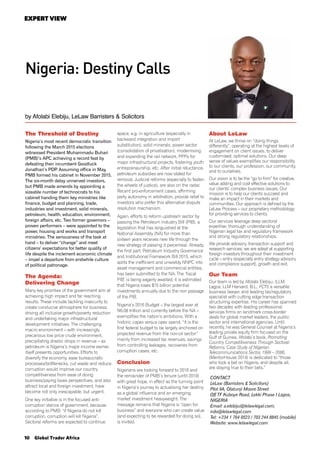
LeLaw - Destiny Calls (2016 GG to African Markets)
- 1. 10 Global Trader Africa EXPERT VIEW Nigeria: Destiny Calls The Threshold of Destiny Nigeria’s most recent democratic transition following the March 2015 elections witnessed President Muhammadu Buhari (PMB)’s APC achieving a record feat by defeating then incumbent Goodluck Jonathan’s PDP. Assuming office in May, PMB formed his cabinet in November 2015. The six-month delay unnerved investors, but PMB made amends by appointing a sizeable number of technocrats to his cabinet handing them key ministries like finance, budget and planning, trade, industries and investment, solid minerals, petroleum, health, education, environment, foreign affairs, etc. Two former governors – proven performers – were appointed to the power, housing and works and transport ministries. The seriousness of the task at hand – to deliver “change” and meet citizens’ expectations for better quality of life despite the inclement economic climate – impel a departure from erstwhile culture of political patronage. The Agenda: Delivering Change Many key priorities of the government aim at achieving high impact and far reaching results. These include tackling insecurity to create conducive atmosphere for business; driving all inclusive growth/poverty reduction and undertaking major infrastructural development initiatives. The challenging macro environment – with increasingly precarious low price crude environment, precipitating drastic drops in revenue – as petroleum is Nigeria’s major income earner, itself presents opportunities. Efforts to diversify the economy, ease bureaucratic processes/bottlenecks, cut waste and reduce corruption would improve our country competitiveness from ease of doing business/paying taxes perspectives, and also attract local and foreign investment, have become not only inescapable, but urgent. One key initiative is in the focused anti- corruption stance of government, because according to PMB: “if Nigeria do not kill corruption, corruption will kill Nigeria”. Sectoral reforms are expected to continue apace, e.g. in agriculture (especially in backward integration and import substitution), solid minerals, power sector (consolidation of privatisation), modernising and expanding the rail network, PPPs for major infrastructural projects, fostering youth entrepreneurship, etc. After initial reluctance, petroleum subsidies are now slated for removal. Judicial reforms (especially to fasten the wheels of justice), are also on the radar. Recent pro-enforcement cases, affirming party autonomy in arbitration, provide relief to investors who prefer this alternative dispute resolution mechanism. Again, efforts to reform upstream sector by passing the Petroleum Industry Bill (PIB), a legislation that has languished at the National Assembly (NA) for more than sixteen years receives new life through the new strategy of passing it piecemeal. Already, the first part, Petroleum Industry Governance and Institutional Framework Bill 2015, which splits the inefficient and unwieldy NNPC into asset management and commercial entities, has been submitted to the NA. The ‘fiscal PIB’ is being eagerly awaited; it is estimated that Nigeria loses $15 billion potential investments annually due to the non passage of the PIB. Nigeria’s 2016 Budget – the largest ever at N6.08 trillion and currently before the NA – exemplifies the nation’s ambitions. With a historic capex versus opex spend, “it is the first federal budget to be largely anchored on projected revenue from the non-oil sector” mainly from increased tax revenues, savings from controlling leakages, recoveries from corruption cases, etc. Conclusion Nigerians are looking forward to 2016 and the remainder of PMB’s tenure (until 2019) with great hope, in effect as the turning point in Nigeria’s journey to actualising her destiny as a global influence and an emerging market investment heavyweight. The message remains that Nigeria is “open for business” and everyone who can create value (and expecting to be rewarded for doing so), is invited. About LeLaw At LeLaw, we thrive on “doing things differently”, operating at the highest levels of engagement on client issues, to deliver customised, optimal solutions. Our deep sense of values exemplifies our responsibility to our clients, our profession, our community, and to ourselves. Our vision is to be the “go to firm” for creative, value adding and cost effective solutions to our clients’ complex business issues. Our mission is to help our clients succeed and make an impact in their markets and communities. Our approach is defined by the LeLaw Process – our proprietary methodology for providing services to clients. Our services leverage deep sectoral expertise, thorough understanding of Nigerian legal tax and regulatory framework and strong regulatory relationships. We provide advisory, transaction support and research services; we are adept at supporting foreign investors throughout their investment cycle – entry (especially entry strategy advisory and compliance support), growth and exit. Our Team Our team is led by Afolabi Elebiju, (LLM, Lagos; LLM Harvard, B.L., FCTI) a versatile business lawyer, and leading tax/regulatory specialist with cutting edge transaction structuring expertise. His career has spanned two decades with leading professional services firms on landmark cross-border deals for global market leaders, the public sector and international agencies. Until recently, he was General Counsel at Nigeria’s leading private equity firm focused on the Gulf of Guinea. Afolabi’s book, Promoting Country Competitiveness Through Sectoral Reforms: Case Study of Nigerian Telecommunications Sector, 1999 – 2006, (MentorHouse 2014) is dedicated to “those who took a bet on Nigeria, and despite all, are staying true to their bets.” CONTACT LeLaw (Barristers & Solicitors) Plot 9A, Olatunji Moore Street Off TF Kuboye Road, Lekki Phase I Lagos, NIGERIA Email: a.elebiju@lelawlegal.com; info@lelawlegal.com Tel: +234 1 764 0523 / 703 244 8845 (mobile) Website: www.lelawlegal.com by Afolabi Elebiju, LeLaw Barristers & Solicitors